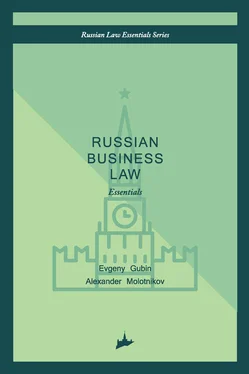Evgeny Gubin - Russian business law - the essentials
Здесь есть возможность читать онлайн «Evgeny Gubin - Russian business law - the essentials» — ознакомительный отрывок электронной книги совершенно бесплатно, а после прочтения отрывка купить полную версию. В некоторых случаях можно слушать аудио, скачать через торрент в формате fb2 и присутствует краткое содержание. Город: Moscow, Год выпуска: 2016, ISBN: 2016, Жанр: foreign_language, Юриспруденция, popular_business, на английском языке. Описание произведения, (предисловие) а так же отзывы посетителей доступны на портале библиотеки ЛибКат.
- Название:Russian business law: the essentials
- Автор:
- Жанр:
- Год:2016
- Город:Moscow
- ISBN:978-5-9904334-9-6
- Рейтинг книги:3 / 5. Голосов: 1
-
Избранное:Добавить в избранное
- Отзывы:
-
Ваша оценка:
- 60
- 1
- 2
- 3
- 4
- 5
Russian business law: the essentials: краткое содержание, описание и аннотация
Предлагаем к чтению аннотацию, описание, краткое содержание или предисловие (зависит от того, что написал сам автор книги «Russian business law: the essentials»). Если вы не нашли необходимую информацию о книге — напишите в комментариях, мы постараемся отыскать её.
Russian business law: the essentials — читать онлайн ознакомительный отрывок
Ниже представлен текст книги, разбитый по страницам. Система сохранения места последней прочитанной страницы, позволяет с удобством читать онлайн бесплатно книгу «Russian business law: the essentials», без необходимости каждый раз заново искать на чём Вы остановились. Поставьте закладку, и сможете в любой момент перейти на страницу, на которой закончили чтение.
Интервал:
Закладка:
iii) A public movement is a public association consisting of participants who are pursuing social, political and other socially useful purposes, supported by the participants of the public movement.
iv) An association (union) is an association of legal entities and/or citizens based on voluntary or, in the cases established by the law, on obligatory membership, and are created to represent and protect the common interests, including professional interests, to achieve socially useful purposes, as well as other purposes which are not contradictory with the law, and are of a non-commercial nature. Non-commercial partnerships are also referred to as associations (unions).
v) A fellowship of real estate owners is a voluntary association of real estate owners, created by them for the purposes of joint ownership, use, and within the limits set by law, disposal of the property, which by virtue of the law are under their common property or in common use, as well as the achievement of other goals which are not contradictory with the law.
vi) The Cossack communities are an association of citizens, entered in the state register of the Cossack societies in the Russian Federation, created to preserve a traditional way of life, and manage the culture of the Russian Cossacks, as well as for other purposes stipulated by law, with obligations of carrying out state or other services, as undertaken in accordance with the law.
vii) The communities of Aboriginal Smaller Peoples of the Russian Federation are voluntary associations of the citizens belonging to the Aboriginal Smaller Peoples of the Russian Federation, and are united by kinship and/or territorial and neighborhood principles, aiming at the protection of the primordial habitat, preservation and development of the traditional way of life, housekeeping, crafts and culture.
viii) The Chambers of Advocates are non-profit organizations based on obligatory membership, and are created in the form of the Chamber of Advocates of the Subject of the Russian Federation, or the Chamber of Advocates of the Russian Federation Federal, for the realization of the purposes provided by the legislation on advocacy.
ix) The advocacy formations, being legal entities [41] In the section on corporations, we consider advocacy formations that are legal entities.
are non-profit organizations, created in accordance with the advocacy legislation aiming at the implementation of advocacy by the participants.
5.2. Non-Profit Unitary Organizations
i) A fund is a unitary non-profit and non-membership organization, founded by the citizens and/or legal entities, on the basis of voluntary property contributions and pursuing charitable, cultural, educational, or other social or socially useful purposes.
ii) An institution is a unitary non-profit organization created by the owners for the implementation of managerial, socio-cultural, or other functions of a non-commercial nature. A founder is the owner of the property of an established institution. It gets the right to operational management of the property assigned by an owner to an institution, and is acquired by an institution on other bases in accordance with the CC of the RF.
iii) An autonomous non-profit organization is a unitary non-profit and non-membership organization, established on the basis of property contributions of citizens and/or legal entities, aiming at the rendering of services in the spheres of education, health care, culture, science, and other non-commercial activities.
iv) A religious organization is a voluntary association of the citizens of the Russian Federation, permanently and lawfully residing in the territory of the Russian Federation, or other persons, formed by them, aimed at joint confession and spreading of the faith, and registered as a legal entity in accordance with the law (a local religious organization), unions of these organizations (the centralized religious organization), as well as an organization, created by the given union and/or managing or coordinating body of the union. This is in accordance with the law on freedom of conscience and religious associations, and these organizations are aiming at the joint confession and spreading of the faith.
v) The Public-Legal Companies
The public-legal companies are an organizational-legal form of legal entities, which are new to Russia, that appeared in the CC of the RF in 2014. However, currently neither the CC of the RF, nor other laws, contain any norms establishing the legal status of these organizations. This shortcoming is expected to be corrected soon.
vi) The State Corporations
The possibility to create state corporations is provided in Article 3 of the Federal Law No. 99-FZ dated May 5, 2014. State corporations are created for the purposes of the implementation of social, managerial or other socially useful functions. Each state corporation is created on the basis of a separate federal law that establishes features of the legal status thereof.
Currently the following state corporations are operating in Russia:
– Rosatom State Corporation of Atomic Energy;
– State Corporation for the Promotion of the Development, Production and Export of Hi-Tech Industrial Products “Rostec”;
– State Corporation “Bank for Development and Foreign Affairs (Vnesheconombank)”
vii) The State Companies.
The only state company currently operating in Russia is the State Company "Russian Highways.” It operates under ad hoc federal law. The legislation does not provide a possibility for the creation of new legal entities in the form of state companies.
Svetlana Popova [42] Legal analyst, Consultant Plus; Lomonosov Moscow State University, LL. B. 2013.
Chapter 3 – Core Business Contracts
1. The Contract As a Basis for Creating Obligations
1.1. The definition of a contract under Russian law
Under Clause 1 of Article 420 of the Civil Code of the Russian Federation, a contract shall be recognized as an agreement, concluded by two or more persons of the institution, upon modification or termination of civil rights and duties. The general provisions on obligations (Articles 307–419 of the CC of the RF) shall be applied towards the obligations, arising from the contract, unless otherwise provided in the provisions of the CC of the RF, governing individual types of contracts or in the general provisions on contracts set forth in the CC of the RF.
The contract is also a bilateral or multilateral transaction. Therefore, as a general rule, the provisions on transactions set forth in Chapter 9 of CC of RF are applicable to contractual relations. Nevertheless, two exceptions to this rule have been implemented as a result of the amendments to the CC of the RF, which have been in force since July 1, 2015. [43] See Federal law No. 42-FZ, dated March 8, 2015, “On Amending Part One of the Civil Code of the Russian Federation,” // “ConsultantPlus” Legal Directory System
The first exception concerns the application of the provisions on the invalidity of contractual transactions, which are related to entrepreneurial activity undertaken by the parties. Thus, as a general rule, the party which accepted the performance of the business contract from the counterparty, and fully or partially failed to ensure reciprocal performance of that contract, cannot claim the invalidity of the contract. The second exception pertains to the application of general consequences of the invalidity of transactions within business contracts. The parties of such a contract, which is a voidable transaction, may agree on additional consequences of invalidity, other than those provided in Article 167 of the CC of the RF. Furthermore, such an agreement should be concluded after the declaration of the contract as invalid, should not affect the rights of third parties, and should not violate the public interest.
Читать дальшеИнтервал:
Закладка:
Похожие книги на «Russian business law: the essentials»
Представляем Вашему вниманию похожие книги на «Russian business law: the essentials» списком для выбора. Мы отобрали схожую по названию и смыслу литературу в надежде предоставить читателям больше вариантов отыскать новые, интересные, ещё непрочитанные произведения.
Обсуждение, отзывы о книге «Russian business law: the essentials» и просто собственные мнения читателей. Оставьте ваши комментарии, напишите, что Вы думаете о произведении, его смысле или главных героях. Укажите что конкретно понравилось, а что нет, и почему Вы так считаете.












